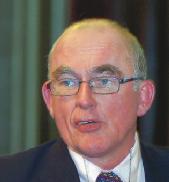
Mike began with a potted biography of his career. He was first elected as a councillor in Newcastle-U-Lyme in 1980 and sat for four years. In '81 he was elected to Staffs County Council and remained there for the next 16 years. From '94-'99 he was Labour MEP for the Staffs West and Congleton European constituency. From 2004-8 he represented Blurton on Stoke City Council, leading the Labour group in his final year before losing his seat. In addition he chaired Stoke South Primary Care Trust from 01-06 and is currently a member of the so-called transition board charged with implementing the recent governance commission report for restructuring local government in the Potteries.
Over the course of his career there has been a marked decline in political participation (defined as voting). For example, the turnout for the 1979 general election was 76 per cent. By 2005 it had declined to 61 per cent, and fell to 34.7 per cent for this year's European elections (though, it should be worth noting, turnout tends to be much lower for 'second order' elections). For Mike there are a number of reasons for this. First is the growing fragmentation of Britain's (Westminster) two-and-a-half party system, first in its geographical peripheries (Scotland, Wales) and then in England itself with the emergence of the three main minor parties - UKIP, the BNP and Greens. The causes of declining participation and fragmentation is bound up with the disintegration of deference, which in turn was an effect of the class relationships that predominated before 1979. For example, in Stoke communities were concentrated the pits and pot banks. As the industries closed class relationships began to change, dispersing the relatively cohesive collectives they called into being.
Other long term processes were at work too. The hype around globalisation has created the impression that governmental powers have been dissolved by immense global forces beyond the reach of government - so what's the point in voting if politicians can't change anything? There's also the perception politicians are all corrupt and on the make, are socially different from the electorate (many 'younger' MPs and PPCs have gone straight from university to a career in wonkland, and from there to parliament). Finally the insatiable maw of 24/7 news has done a great deal to undermine the control parties have over their message, and the pervasiveness of celebrity culture has successfully supplanted politics, partly because it appears more relevant to many people than the rarefied goings ons in Westminster.
Having diagnosed the many ills of mainstream politics it then moved on to a Q&A session, which revolved around two points. One of these was his career. Asked about his record and what he thought he'd achieved in his five years as a MEP, he listed keeping Indian and Chinese ceramics out of the European market for five years, retaining the back stamp on pottery and securing funding for reemployment in North Staffs.
The other was the party and electoral system. Mike admitted he was unfashionable but believed the present winner takes all system (modified with transferable votes if no one scores the 50 per cent plus one) is the best of all possible worlds. He believes in "the smack of firm government" and argued you trade off effective government as a system becomes more proportional. This is not a boon for democracy as such because the subsequent horse trading that builds coalitions is between political elites. It is no more participatory than the Westminster system. As for the two party system itself, it will only survive if it appeals to the broad spectrum of mainstream opinion.
As I was wearing my sessional tutor hat (and not being a student) I didn't get stuck in, though if I had I wouldn't have gone down the route of 'isn't it time for a new workers' party' point scoring. Instead I'd have asked if Mike believed the neoliberal consensus had turned millions of people off from politics, and if so what sort of politics could begin to address the disconnect? That he stuck to sociological arguments at the expense of political explanations for the crisis was quite telling. How can we expect mainstream politics to change if it can't even look at its failings in a mirror?
That's it. I've spoken to thousands of people on stalls and doorsteps since joining the SP almost four years ago and most of them who won't be voting are far from apathetic. And though some events can encourage engagement in politics - expenses are one, Nick Griffin on Question Time another- it needs to be sustained, and that will only happen when parties offer alternatives to one another.
ReplyDelete